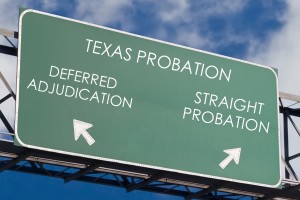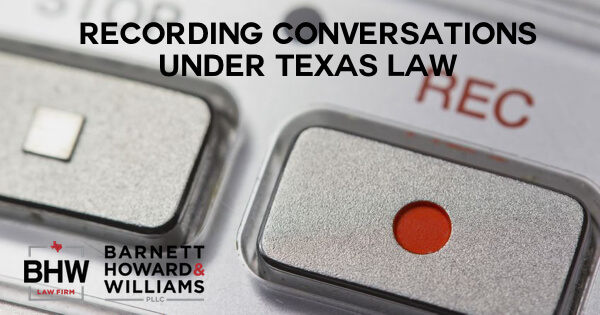Probation in Texas: Make Sure You are Headed Down the Right Path. What is Deferred Adjudication?
 When we are counseling new clients, we routinely address the punishment range that is available for the charged offense and whether probation is an option in their case. It is important to note that all criminal offenses (except class C citations) are punishable by incarceration. However, first-time offenders and those charged with misdemeanors and non-aggravated felonies will often receive probation when prosecutors, judges, and juries agree that community supervision (probation) is a better alternative to jail time in the given situation. For some offenses, however, probation is not an option (see our previous article on 3g offenses in Texas).
When we are counseling new clients, we routinely address the punishment range that is available for the charged offense and whether probation is an option in their case. It is important to note that all criminal offenses (except class C citations) are punishable by incarceration. However, first-time offenders and those charged with misdemeanors and non-aggravated felonies will often receive probation when prosecutors, judges, and juries agree that community supervision (probation) is a better alternative to jail time in the given situation. For some offenses, however, probation is not an option (see our previous article on 3g offenses in Texas).
For those of you that prefer the bullet points up front, here is the short answer regarding the difference between straight probation and deferred adjudication:
Straight Probation in Texas
- A person on Straight Probation in Texas must report to probation and complete required terms as set by the judge
- In a straight probation, the case results in a Criminal Conviction
- In straight probation, there is no option have the case expunged or non-disclosed upon completion of probation
- If revoked on a straight probation, the penalty range is limited to the underlying jail term (see more below).
Deferred Adjudication in Texas
- A person on Deferred Adjudication in Texas must report to probation and complete required terms as set by the judge
- A Deferred Adjudication Case Does NOT result in a Criminal Conviction
- In a Deferred Adjudication in Texas, there is an option to have the case non-disclosed upon completion (in most cases)
- Under a Deferred Adjudication, If revoked, the judge may sentence anywhere in the full punishment range for the offense.
Deferred Adjudication vs. Straight Probation
In Texas, there are two types of community supervision in criminal cases: regular community supervision (or what is typically referred to as “straight probation”) and deferred adjudication (or “deferred probation.”) The difference between them is significant. Chapter 42.12 of the Texas Code of Criminal Procedure covers with both types of probation in Texas.
Straight Probation in Texas
Let’s discuss straight probation first. As an example, assume someone is facing a charge for a Class A Misdemeanor. The penalty range is 0-365 days in jail. A straight probation offer from the state might look like this:
180 days in jail probated for 12 months.
If you agree to this offer and decide to take it, at the time of the plea the judge would ask for your plea of guilty, find you guilty and assess punishment at 180 days in jail. However, he would not require you to actually serve the jail time. Rather, he would probate the jail time and place you on community supervision for a period of 12 months. If you successfully complete the straight probation by reporting as directed and abiding by the terms and conditions, you would not be required to serve jail time for the conviction.
Straight Probation Comes With a Criminal Conviction
With straight probation, the most significant consequence is the conviction itself. When you plead guilty, the judge finds you guilty and a conviction is rendered. You avoid jail time by the sentence being probated, but the conviction remains on your record. A conviction, even if probation, can never be expunged from your record (regardless of the passage of time), so it is important to be wise with your decision to take a plea agreement in which straight probation is offered.
If you receive straight probation and fail to comply with the terms and conditions, the state can seek to have your probation revoked. At a revocation hearing or sentencing, the judge’s sentencing ability is limited by the underlying sentence received at the time of your original plea. So, in the above example, if you received a sentence for 180 days in jail probated for 12 months and are later revoked, the judge cannot sentence you beyond the 180 days (even though the penalty range for a class A misdemeanor is up to 365 days.)
Deferred Adjudication in Texas
Chapter 42.12 section 5 offers a different type of probation than the straight probation discussed above. It’s called deferred adjudication. Let’s go back to our example and say your facing a Class A Misdemeanor with a penalty range of 0-365 days. A deferred adjudication offer might look like this:
18 months probation
If you agree to this offer, you would plead guilty at the time of the plea. However, the judge would withhold finding you guilty and instead place you on probation for a period of 18 months. The reporting and terms and conditions would mirror those of a straight probation. If you successfully complete the probation and are discharged, you would not be required to serve jail time and you would not receive a criminal conviction.
Deferred Adjudication Does Not Come With a Criminal Conviction
With deferred adjudication, the most significant benefit is the case is dismissed upon discharge and no conviction rendered. You not only avoid jail time, but a conviction as well. You also may be eligible to file for a non-disclosure after discharge in most cases. Section 411.081 of the Texas Government Code is the law covering when and if you can file for a non-disclosure after discharge from deferred adjudication.
As with straight probation, if you receive deferred adjudication and fail to comply with the terms and conditions, the state can seek to have your probation revoked. However, there are some significant distinctions at a revocation hearing or sentencing on a deferred adjudication case. First, the judge’s sentencing ability is unlimited. This means he can use the entire penalty range. In our example, if you receive deferred adjudication for 18 months for a class A misdemeanor and are later revoked, the judge can sentence you anywhere in the penalty range of 0- 365 days. Also and more importantly, if revoked, the judge will find you guilty resulting in a conviction.
Contact Our Fort Worth Criminal Defense Firm if You Have Questions About Deferred Adjudication or Straight Probation in Texas
This was a rough overview of the different types of probation in Texas on criminal cases. Of course, there are always factors that can effect if and which type of probation is available as an option to you. The attorneys at Barnett Howard & Williams PLLC would be glad to discuss your situation and provide more information about these options. Please feel free to give us a call at (817) 993-9249.
NOTE:
→ DWI offenses are not eligible for deferred adjudication in Texas. If you’d like to see that changed, contact your state representatives’ offices and voice your opinion










